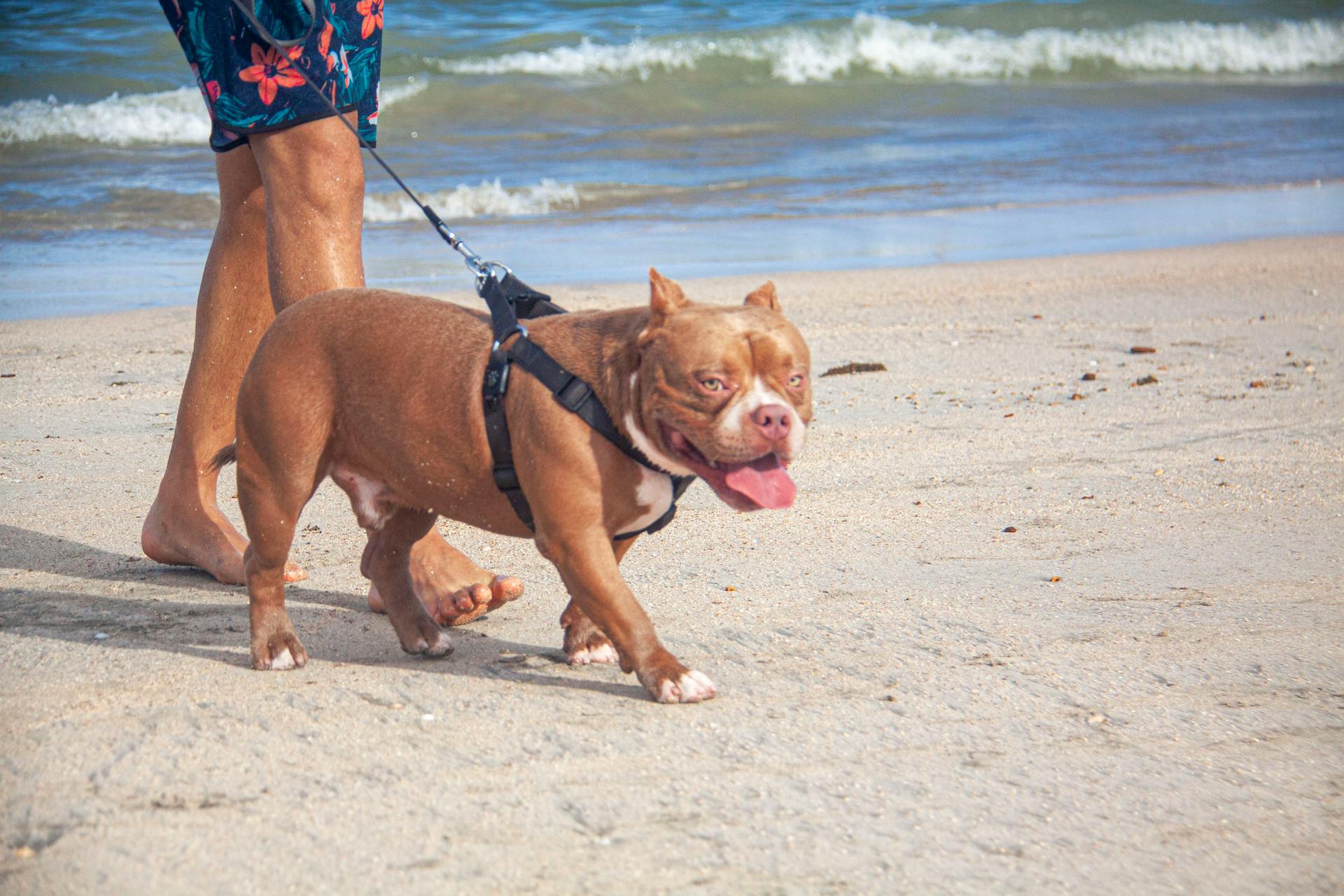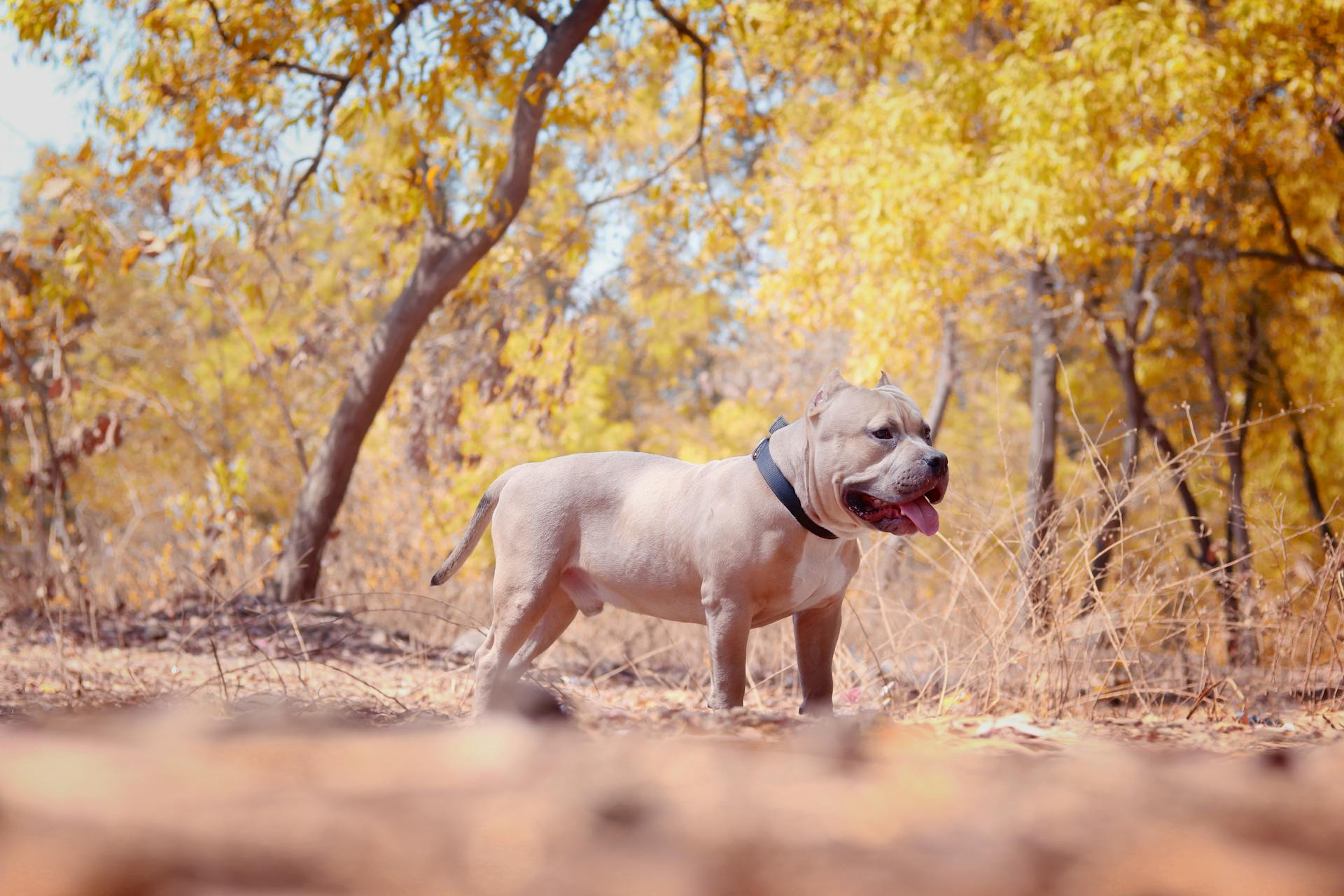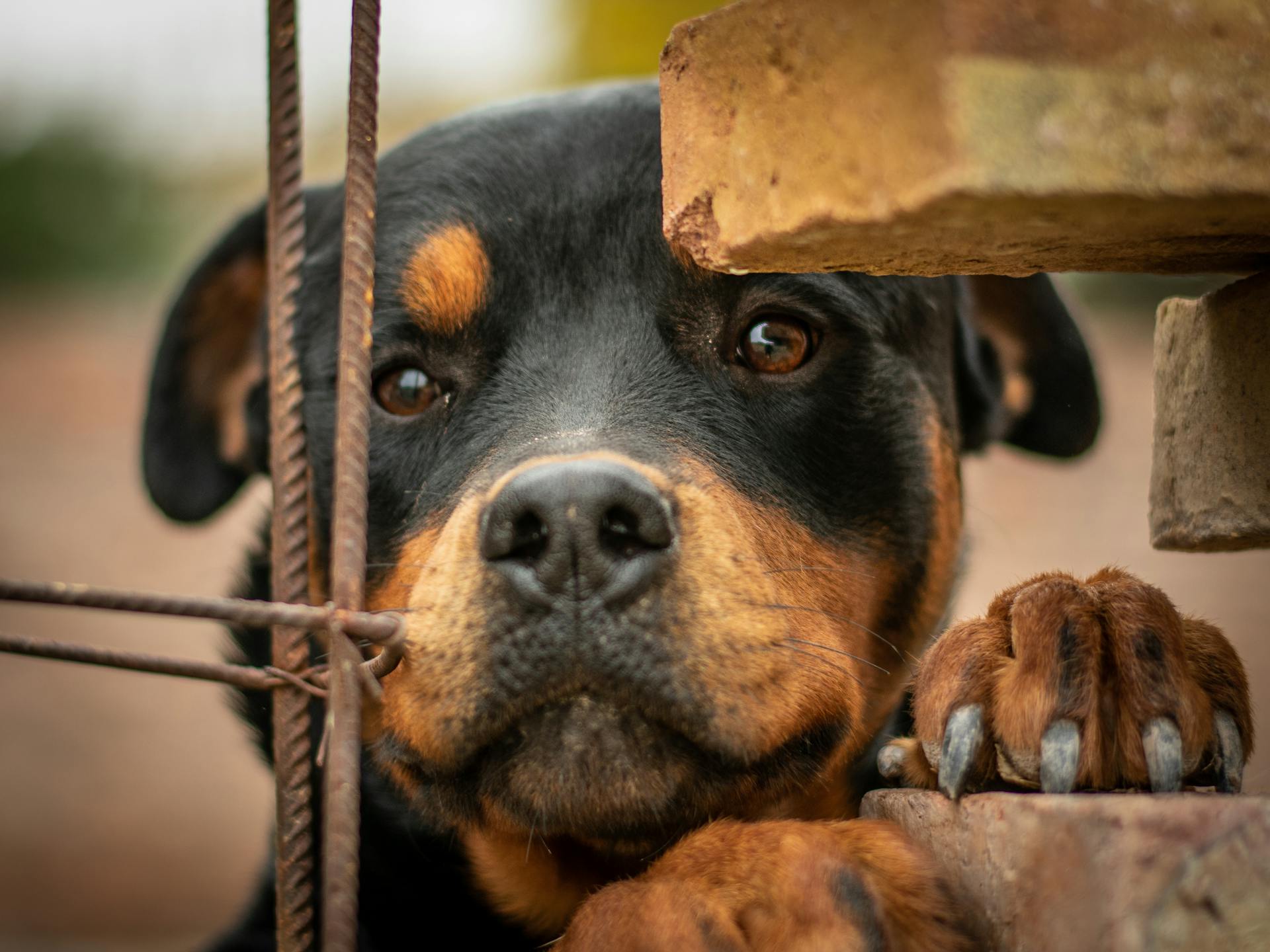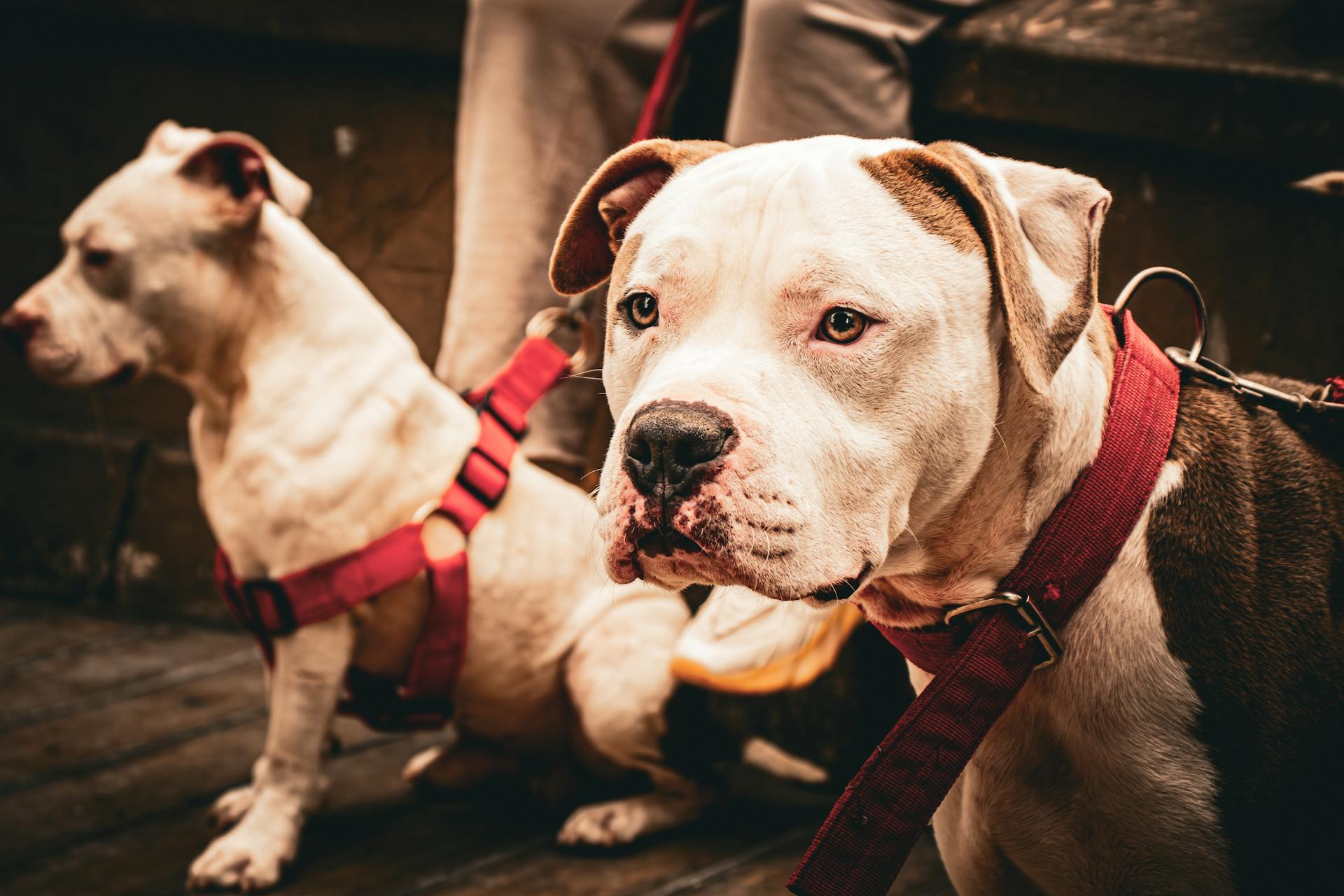
The American Bulldog is a sturdy and confident breed that originated in the United States. They were initially bred for work, such as guarding and fighting, but have since become beloved family pets.
American Bulldogs are known for their distinctive physical appearance, with a muscular build, short coats, and a broad head. Their weight can range from 70 to 120 pounds.
Their short coats require minimal grooming, making them a great choice for busy owners. This breed is also generally quiet, with a short, deep bark.
Despite their tough exterior, American Bulldogs are known for their gentle and affectionate nature.
Curious to learn more? Check out: American Bully Coats
Physical Characteristics
American Bulldogs have a distinctive physical appearance that sets them apart from other breeds. They have large heads, powerful jaws, and a beefy build that includes a deep, broad chest and broad back.
Their muscular shoulders and forearms are a testament to their athleticism and strength. American Bulldogs are known to be stocky and heavily built dogs.
A key characteristic of the breed is their short coat, which requires little maintenance except for an occasional bath. Their coat can come in a variety of colors, including white, black, brown, red, tan, and brindle.
Their eyes are typically brown, but blue eyes can occur, although they are not common. American Bulldogs have a wide muzzle with a slight taper toward a black or liver-colored nose.
Here's a summary of their physical characteristics:
- Head: Large, powerful jaws
- Build: Stocky and heavily built
- Coat: Short, smooth
- Coat Color: White, black, brown, red, tan, brindle
- Eyes: Brown, blue (rare)
- Nose: Black or liver-colored
- Weight: 27-54 kg (60-119 lb)
- Height: 52-70 cm (20-28 in)
American Bulldogs have a proud stance, with a powerful chest and confident gait that signals their readiness to move and play.
Explore further: Dogs Breeds That Start with B
Care and Maintenance
The American Bulldog breed is known for being relatively low-maintenance when it comes to grooming. They have short hair, which means weekly brushing sessions with a bristle brush are enough to keep their coat smooth and shiny.
To keep your American Bulldog's teeth clean, aim for daily brushing if possible, but a few times a week is also a good goal. This will help prevent dental disease by beating back sticky plaque and tartar.
Nail trimming should be done every couple of weeks, and ear cleaning once a month is usually sufficient. Bathing your American Bulldog can be done about once a month, unless they get into something smelly or dirty.
Here's a quick rundown of the grooming tasks to keep your American Bulldog healthy and clean:
- Brush their coat weekly with a bristle brush
- Brush their teeth daily or a few times a week
- Trim their nails every couple of weeks
- Clean their ears monthly
- Bath them about once a month
Remember to also schedule annual professional cleanings with your vet to keep your American Bulldog's teeth and overall health in top shape.
Health and Nutrition
American Bulldogs are prone to several health issues, so it's essential to be aware of these potential problems. Joint Dysplasia, a joint abnormality, is common in the breed and can be treated with joint supplements, medications, or surgery.
Knee Ligament issues, such as CCL ruptures, are also prevalent and often require surgery. Cherry Eye, a condition where the gland near the inner corner of the lower lid protrudes, can cause secondary eye problems and requires surgical correction.
Explore further: English Bulldog Skin Problems
Here are some common health issues in American Bulldogs:
- Joint Dysplasia
- Knee Ligament issues (CCL ruptures)
- Cherry Eye
- Deafness
- Skin Conditions/Allergies
- Spinal Issues (Degenerative Myelopathy)
- Neuronal Ceroid Lipofuscinosis (NCL)
American Bulldogs need a high-quality diet that's formulated for large dogs, with large-breed puppy food for the first 14 months of life. You should also avoid foods with added calcium until they're eating adult food.
You might enjoy: Best Dog Food for Rhodesian Ridgeback
Nutrition
American Bulldogs require a high-quality diet formulated for large dogs to ensure they grow at a slow and steady pace.
Feed your puppy large-breed puppy kibble for the first 14 months of life to support their growth.
You should skip foods or supplements with added calcium until your puppy is fully grown and eating an adult diet, as it can disrupt healthy bone development.
Once your American Bulldog is an adult, check with your vet to see if you need to add any supplements to support your dog's joint or muscle health.
Curious to learn more? Check out: Adult Boston Terrier
Health
American Bulldogs are prone to several health issues, and being aware of these can help you provide the best possible care for your pup. Joint Dysplasia is a common issue, causing joint abnormality in the hips and elbows, leading to reduced mobility and exercise.
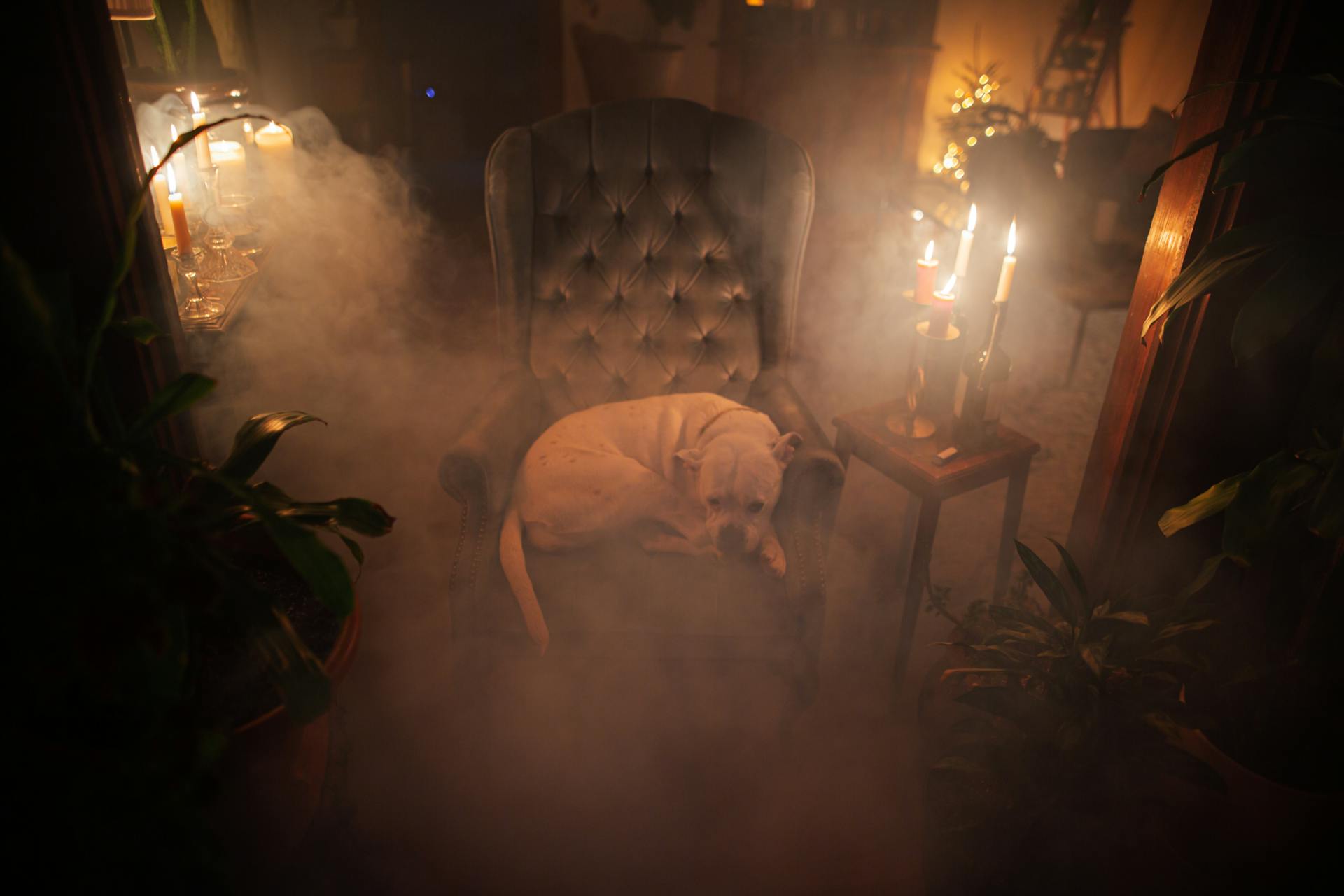
Some American Bulldogs may be born with a genetic condition that affects their vision, including Canine Multifocal Retinopathy 1 (CMR1), which can cause retinal decay and impact vision. Hyperuricosuria (HUU) is another condition that can affect your dog's kidneys and bladder, leading to the formation of stones.
Cherry Eye is a condition that affects the third eyelid, causing a red mass to appear near the inner corner of the lower lid. If left untreated, it can lead to secondary issues such as dry eye, infection, or corneal ulcers. Deafness can also occur in American Bulldogs, often linked to light coats and eyes, and while there's no treatment, dogs with inherited deafness can still live a happy and healthy life.
Skin conditions and allergies are common in American Bulldogs, often caused by an overactive immune system. Clinical signs may include itching, hair loss, licking, red skin, or skin infections, which can be treated with medication or a prescription diet.
Here are some of the health issues that can affect American Bulldogs:
- Joint Dysplasia: affects hips and elbows, leading to reduced mobility and exercise
- Canine Multifocal Retinopathy 1 (CMR1): causes retinal decay and impacts vision
- Hyperuricosuria (HUU): affects kidneys and bladder, leading to stone formation
- Cherry Eye: causes a red mass near the inner corner of the lower lid
- Deafness: often linked to light coats and eyes
- Skin conditions and allergies: caused by an overactive immune system
It's essential to work closely with your veterinarian to monitor your dog's health and address any potential issues early on. With proper care and attention, you can help your American Bulldog live a happy, healthy, and fulfilling life.
Temperament and Training
American Bulldogs are naturally protective of their families, but they can be wary of strangers and other pets, especially cats and small animals. With early socialization, you can reduce the risk of aggression towards other pets or people.
Their high energy levels require daily mental and physical activity to prevent hyperactivity and undesirable behaviors. This means you'll need to provide regular exercise and engaging activities to keep them happy and healthy.
American Bulldogs are intelligent and respond well to firm, consistent obedience training and socialization. They thrive on structure and clear boundaries, making them a great fit for experienced dog owners. With patience and positive reinforcement, you can teach them to be well-mannered and manageable adults.
For more insights, see: Are Corgis Good Pets
Temperament
American Bulldogs require daily mental and physical activity to prevent hyperactivity and undesirable behaviors.
This breed is best for experienced dog owners, as they need firm, consistent obedience training and socialization to be friendly toward strangers and easy to control in all situations.
They can be wary of cats and other small pets, and may react to strange dogs—especially those of the same sex.
However, with early socialization, you can reduce the risk of such events.
American Bulldogs are highly intelligent and capable of learning with the best of them, making them a great breed for those willing to invest time in training.
Their confident demeanor and playful antics make them an excellent family companion, and they do well with kids and babies.
But, they may be distant with strangers at first, so socialization is key.
Their powerful bite force is unlikely to be a concern, as they aren't likely to bite, even when excited.
With consistent training and established rules and boundaries, you can help your American Bulldog become a well-behaved and loving member of your family.
Training
Training is a vital part of raising an American Bulldog, and it's essential to start early. Socialization and puppy training classes can help channel your dog's energy and establish rules and routines during puppyhood.
American Bulldogs are intelligent dogs who learn best with consistent and patient training. They can be described as "hard-headed", but this just means they need a confident and patient trainer to help them understand what's expected.
Establishing rules and routines early on is crucial for a well-behaved adult dog. With a firm but loving hand, you can set proper boundaries and help your American Bulldog grow into a manageable adult.
Regular socialization training with other dogs and people is also essential for your pup's development. This will help them acclimate to new environments and social situations, and it's a great way to give them a chance to explore and learn.
American Bulldogs are naturally confident and love to play, but they can be distant with strangers at first. With consistent training and established rules, they can learn to navigate new situations and people with ease.
As a working breed, American Bulldogs were known for their intelligence and ability to learn quickly. With the right training and guidance, they can become an invaluable companion and family member.
Take a look at this: Why Do People like Chihuahuas
Frequently Asked Questions
Is an American Bulldog the same as a pitbull?
No, American Bulldogs and Pitbulls are closely related but distinct breeds with different temperaments and characteristics
Is an American Bulldog a good family dog?
Yes, American Bulldogs can make loving family companions, but they do require early training and socialization to thrive in a household with children and other pets.
Is the American Bulldog the same as an XL bully?
No, the American Bulldog and XL Bully are distinct breeds, with the XL Bully being a larger version of the standard Bully breed. While related, they have different characteristics and recognition status.
How to tell if your dog is an American Bulldog?
Identify an American Bulldog by its large, broad head, wide muzzle, and small to medium-sized ears. Check for solid colors, white patches, or brindle patterns for a breed-specific appearance
What are the tall Bulldogs?
Meet the American Bulldog, a taller and slimmer version of the classic bulldog breed, weighing between 60-130 pounds
Featured Images: pexels.com
